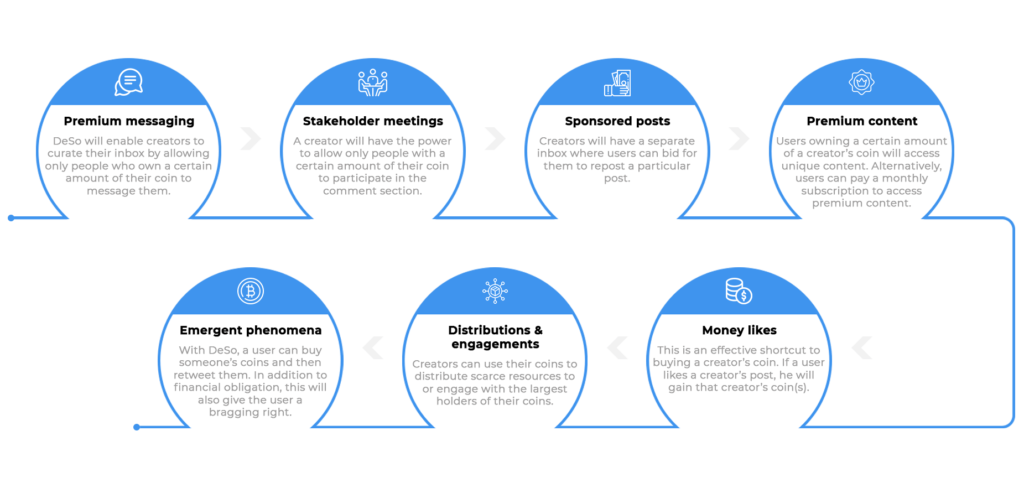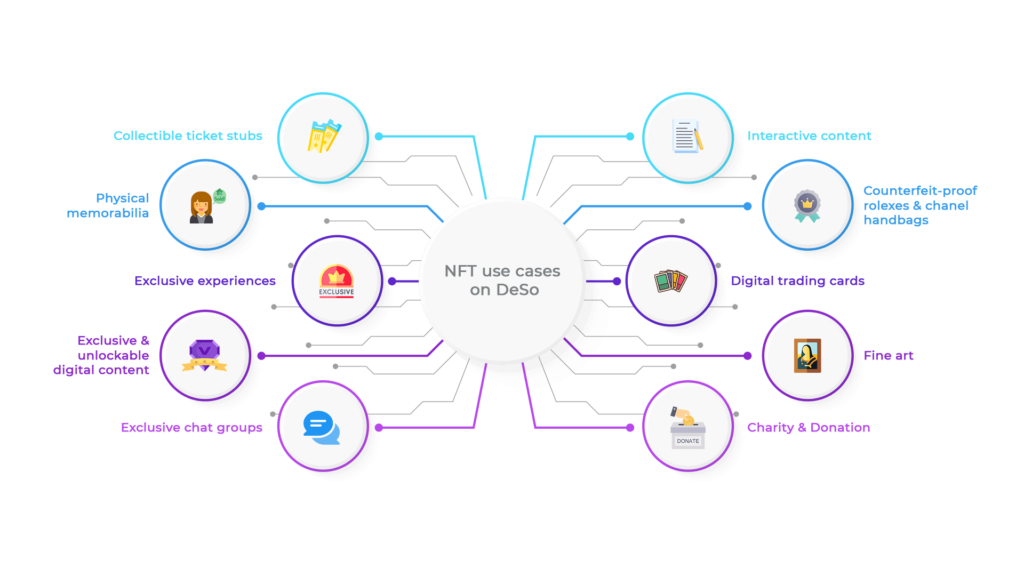

A decentralized social network seems to be the next step in the evolution of social networking. It is a tool that eliminates the need to trust a single entity with your personal information. You are now in complete control of your interactions with others on the network. No big brother is watching over you. You watch over yourself while validating the information you receive. This article will help you better understand DeSo blockchain, its working, and various NFT-based use cases across social media platforms.
Let’s walk through some of the basics:
Decentralized social networks operate on independently run servers and promote transparency and autonomy for users. Common examples of decentralized social platforms are SteemIt, Mastodon, Steepshot, and Musing.
DeSo blockchain is the first and only blockchain that has been custom-built from the ground up to scale these decentralized social networks. Social applications generate a lot of data that the existing blockchain protocols cannot handle. DeSo is solving this issue by building the first-ever truly decentralized social platform that can scale to billions of users.
At the same time, DeSo allows users to control and monetize their data while ensuring security and privacy.
Presently, any post submitted to platforms like Instagram, Twitter, or TikTok belongs to the corporations rather than the creator who posted it. The monetization from these posts also goes predominantly to these corporations.
DeSo will store all the data on a public blockchain, allowing users worldwide to run nodes that can expose curated feeds. With DeSo, users can create their social network and decide how it functions. Instead of having the content supervised by a central authority, the creator of the decentralized social network can define the platform’s acceptable behavior.
The DeSo network project believes that creating a blockchain specific to social media will help accelerate the progress of decentralized social movements. Fundamentally, it is an open protocol that the entire world can build on collaboratively, creating novel ways to unlock the true potential of creators.
Read more: What to know before implementing blockchain in your business?
The DeSo blockchain operates as a unique, sovereign, and decentralized chain. It enables classic social functionalities, e.g., generating profiles and posting, and innovative blockchain-native features such as NFTs, social tokens, and social tipping.
Bare metal is a physical computer server that is used by one and only one consumer or tenant. They are often understood in contrast to virtual servers or virtual machines, which are based on computer architectures and are implemented using specialized hardware, software, or a combination of both.
Traditional blockchains like Ethereum use virtual machines which are slower in operation and cannot build custom indexes for querying.
Blockchains like Ethereum are wonderful for building open financial ecosystems. But lack the design needed to scale and handle storage and indexing requirements of competitive social media apps. For instance, DeFi apps typically update balance entries in place without ever creating a new state. In contrast, each post on a social platform creates a new state that is stored and indexed in a particular way.
Unlike Ethereum and Bitcoin, DeSo is not a ‘general-purpose’ blockchain. It supports a small set of social-oriented features implemented on bare Metal through custom indexes built by every node during consensus.
To understand through an example quoted in DeSo’s whitepaper, consider a task of displaying a simple list of a user’s recent posts. Accomplishing this on a general-purpose blockchain would require building an off-chain index. But with DeSo, it will be easier and faster because DeSo natively supports multiple indexes, including:
The native support of these and many other indexes decrease the complexity of running a node, increasing the number of apps built on DeSo and the decentralization of each ecosystem in turn.
Read more: What are Non-fungible tokens or NFTs?
A common argument against DeSo is that social applications do not necessarily need to store everything on-chain. For instance, an Ethereum-based app initially registers a user’s public key on the chain but stores all posts on a centralized server.
While this may seem like a solution, the problem with this kind of app will be that the person running the centralized server will have an incentive to do so and will eventually turn into a gatekeeper, just like the social platforms today.
However, with DeSo, everything from profiles, posts, and comments to the social token, tipping, and NFT activity is stored on the blockchain. And the structure of a chain can be adjusted as required to maintain this storage.
DeSo is currently equipped to store the following things on-chain:
That said, there are three notable exceptions:
If you are planning to launch a blockchain-based social network, make sure to consult with a reliable blockchain development company to do a feasibility analysis for using DeSo blockchain for your project.
Read more: How to choose the right Blockchain as a Service provider?
DeSo is a one-of-a-kind blockchain that, in addition to social features, also supports features native to a blockchain. These include social tokens, tipping, and NFTs.
Like all blockchain, DeSo has its cryptocurrency that users can use to perform all kinds of tasks on the platform. It introduces creator coins—a new type of asset that is attributed to every profile.
Each profile on DeSo receives its own coin, and anybody can buy or sell this creator coin. A user can have his own creator coin simply by creating a profile. The price of each creator coin goes up when it is bought and down when it is sold.
It even allows users to buy the coins of their favorite creators on the platform.
Read more: What are social tokens and what are its benefits?
Creator coins are tied to the reputation of an individual, not a company or commodity. The value of someone’s coin is correlated to their popularity. Therefore, people who believe in a creator’s potential can buy their coin and succeed financially when the creator makes it big.

DeSo is also hoping to integrate the following opportunities for creator coins:
Reach out to us today to get started.
The DeSo blockchain shifts the narrative of buying an NFT from personal or economic to social. With DeSo NFTs, users have the opportunity to flaunt a creator’s NFT collection on their profile and allow other users to engage with NFTs through likes, comments, diamonds, and more.

Here is a list of new NFT use cases the DeSo can enable.
Read more: Top 10 Doubts And Questions On NFTs Answered
DeSo sends a percentage of the sale of each NFT back to a creator’s coin holders. With this, DeSo NFTs close loops between a creator’s activities on the blockchain and the value of their coin.
Creator coins on DeSo are directly linked to a creator’s activity on the platform, changing the relationship between creator and their fans from one where fans pay for a creator’s work to one where they invest in the creator and grow together.
Tying cashflows to creator coins makes sense for the creators and their fans. Coin-holders are investors and distributors for a creator. With this, a creator’s DeSo NFTs can trade and produce cashflows for creator coins long after the creator has left.
DeSo has explained the workings of a DeSo NFT quite neatly in their whitepaper with a step-by-step guide to creating an NFT on the DeSo app diamond.
The DeSo platform also allows node operators to schedule showcases to concentrate liquidity around certain NFTs. Showcases work in the following way:
Read more: Where will NFTs pop up next?
The DeSo blockchain architecture works in 4 phases-
Ultimately, a user ID can shard all transactions into sub-chains, allowing for virtually unlimited parallelization. So, with 30 shards, another approximate 10x multiplier can be achieved on the TPS without increasing sync time. This will lead to attaining approximately 1B users. Increasing the number of shards will further increase this number.
Read more: How to approach blockchain app development in 2022?
The decentralized social blockchain project offers a relatively comprehensive alternative to the traditional, centralized, and monopolized social media companies. With a native token, DeSo appears to be a more profitable and fair option for creators. It also offers a whole new dimension of opportunities for creator income and fan engagement. For a blockchain project that is less than a year old, DeSo is pioneering decentralization in social media platforms in an unexpectedly impressive way.
Reach out to us today for a no-obligation consultation